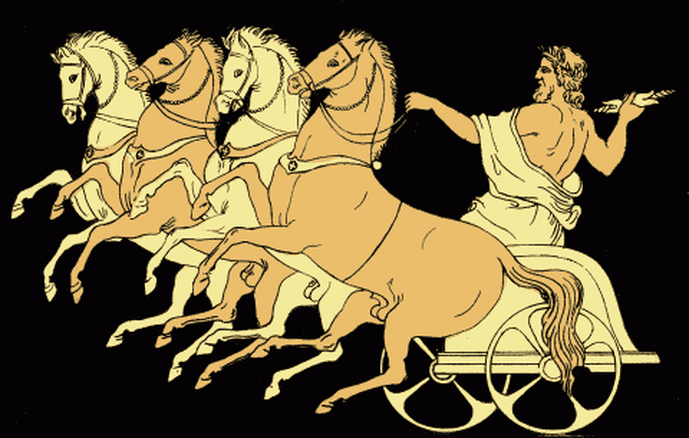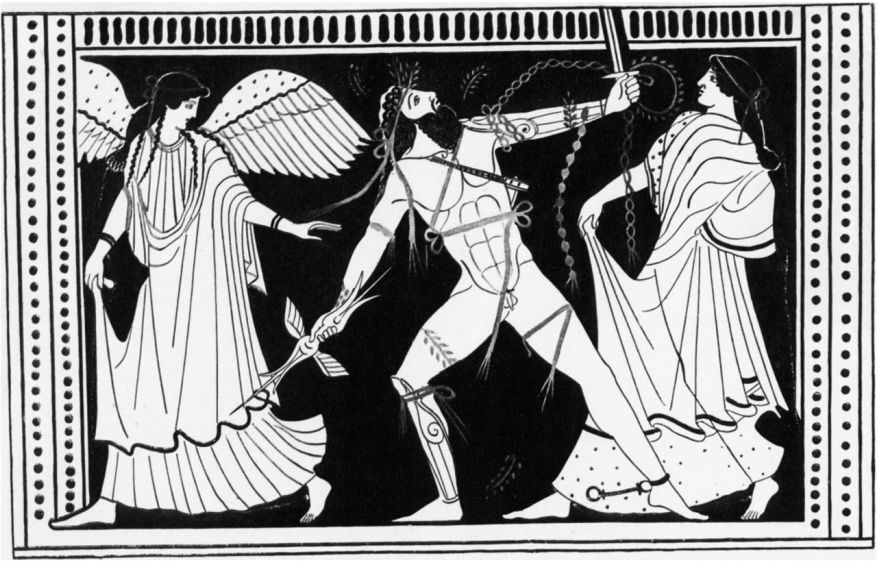Salmoneus
In Greek mythology, Salmoneus (Ancient Greek: Σαλμωνεύς) was a king of Elis and founded the city of Salmone in Pisatis.
Salmoneus was a son of Aeolus and Enarete or Iphis, daughter of Peneus or Laodice and brother of Athamas, Sisyphus, Cretheus, Perieres, Deioneus, Canace, Alcyone, and Perimede. Salmoneus was the father of Tyro by his first wife Alcidice and his second wife was Sidero.
Salmoneus was a king from Greek mythology, but rather than for his kingly status, Salmoneus is much more famous for being an inmate of Tartarus, the hell pit of Greek mythology.
When of age Salmoneus and a number of companions left Thessaly and travelled to the Peloponesse, to the region of Pisatis, a region that would later develop into Elis. Here Salmoneus created a new kingdom called Salmonia.
Salmoneus would wed twice first to Alcidice, daughter of King Aleus of Arcadia, and then after her death, to Sidero. Alcidice would give birth to a single daughter for King Salmoneus, a princess called Tyro.
Tyro was said to be wed to her uncle Cretheus, and gave birth to three sons, Aeson, Amythain and Pheres, as well as two sons to Poseidon, Pelias and Neleus.
There was a great hatred between the sons of Aeolus though, and Sisyphus especially hated Salmoneus, and when an oracle told Sisyphus, that if he wed Tyro, and had sons by her, then these sons would kill Salmoneus.
Somehow, Sisyphus arranged to wed Tyro, and indeed she bore him two sons, but when Tyro learned of the prophecy, she killed these two sons so that her father Salmoneus would not be harmed.
This act of infanticide only saved Salmoneus for a short while, for Salmoneus was well known as being an impious king. Salmoneus refused to undertake the sacrifices and festivals expected of him to honour the gods, and worse still Salmoneus even made fun of Zeus and the other gods.
Salmoneus would order his subjects to refer to him as Zeus, and then would mimic the thunder and lightning of the god, by driving a chariot over a bridge of brass, to imitate the sound, and having torches thrown into the air to match the flashes.
It was never good to anger a god, and Zeus was amongst the quickest to anger, so when he observed the mimicry of Salmoneus, Zeus threw down a thunderbolt killing the king.
The kingdom of Salmonia would eventually fall under the command of Neleus, the grandson of Salmoneus.
The deceased Salmoneus was transported to the underworld, and in Tartarus was subject to eternal punishment for his hubris. The form of the punishment of Salmoneus in Tartarus was not as explicit as that of Ixion, Sisyphus or Tantalus , although Aeneas was said to have observed the former king’s punishment.
CHRONOLOGY OF MYTH
In the chronology of myth Salmoneus was the great-grandson of Deukalion (Deucalion), survivor of the Great Deluge.
His contemporaries included King Perseus of Argos and Kadmos (Cadmus) of Thebes--daughters of these two hero-kings married his brothers. His nephew Endymion ruled the neighbouring kingdom of Elis, north of the river Alpheios.
Of Salmoneus' descendants, his grandson Neleus fought a war with Herakles, and another, Pelias, commanded Jason fetch the Golden Fleece.
His great-grandsons included the seer Melampos, and the Argonauts Jason, Akastos, Admetos, Iphiklos and Periklymenos.
His great-grandson Nestor and many of his great-great-grandsons (i.e. the sons of the Argonauts) were leaders of the Greek army at Troy.

Sources
Homer, The Odyssey - Greek Epic C8th B.C.
Hesiod, Catalogues of Women Fragments - Greek Epic C8th - 7th B.C.
Apollodorus, The Library - Greek Mythography C2nd A.D.
Diodorus Siculus, The Library of History - Greek History C1st B.C.
Strabo, Geography - Greek Geography C1st B.C. - C1st A.D.
Pausanias, Description of Greece - Greek Travelogue C2nd A.D.
Nonnus, Dionysiaca - Greek Epic C5th A.D.
Hyginus, Fabulae - Latin Mythography C2nd A.D.
Ovid, Metamorphoses - Latin Epic C1st B.C. - C1st A.D.
Virgil, Aeneid - Latin Epic C1st B.C.
Valerius Flaccus, The Argonautica - Latin Epic C1st A.D.













